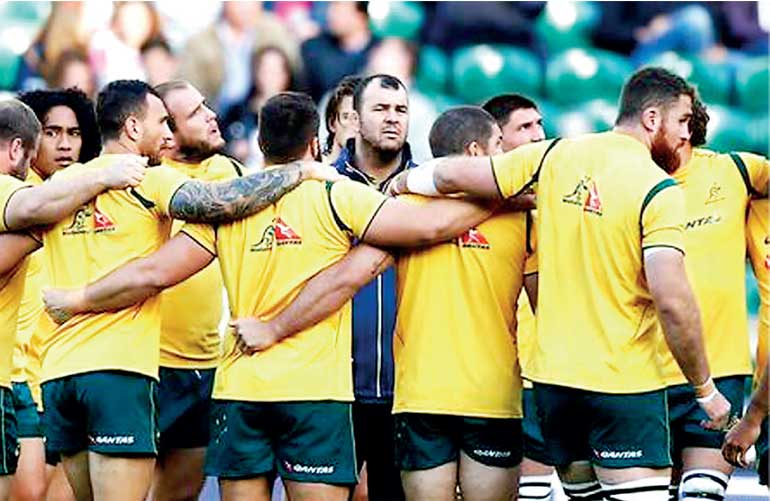Sunday Feb 22, 2026
Sunday Feb 22, 2026
Tuesday, 8 September 2015 00:27 - - {{hitsCtrl.values.hits}}
SYDNEY (Reuters): Coach Michael Cheika pronounced himself satisfied with Australia’s final hit-out before the Rugby World Cup at the weekend, if perhaps for no other reason than they came through it with no serious injuries.
The Wallabies laboured at times in the first half in Chicago but seven tries in a 47-10 thumping of the United States was a confidence-boosting return to winning ways after a drubbing at the hands of the All Blacks last time out. Sean McMahon scored his maiden test try in a Man of the Match performance at openside flanker, back-up hooker Tatafu Polota-Nau put in a typically bullocking display and there was a solid afternoon’s work at the set piece from the pack.
Flyhalf Bernard Foley scored the opening try and provided the initial break for the second in the most assured of his three matches in a gold shirt this year, most importantly nailing all but one of seven place kicks.

That might settle Cheika’s mind over who will be handed the number 10 shirt for the opening Pool A match against Fiji but who starts alongside him at scrumhalf in Cardiff on 23 September might be trickier.
Nick Phipps started the match but failed to bring the effervescent energy that earned him his place in test rugby and, perhaps fatally, was wayward in his passing.
Will Genia is the only other specialist scrumhalf in the squad and he finally got the backline moving in the second half when the pack secured him front-foot ball.
While there might be some worries that Australia tried to go wide before earning the right by running the hard yards up the middle, of more concern might be the kicking from hand of all the key backline playmakers.
With the United States banking on an aggressive rush defence to try and unsettle the visitors, shrewder use of the boot might have opened up the space behind the defensive line and kept the blitzing American tacklers a little more honest.
Under first Ewen McKenzie and now Cheika, it is almost as if Australia have abandoned the art of tactical kicking.
Last resort
McKenzie all but banned it as a crowd-pleasing statement of ‘Australianness’ in his short tenure, while Cheika’s New South Wales Waratahs used the kick from hand less than any other of the 15 Super Rugby teams last season.
The kicks Australia do produce – mostly a last resort when all other options are shut down – are too often aimless while the chases, compared to the likes of the Springboks at least, are seriously lacklustre.
The twice world champions rightly pride themselves on their ability to run the ball but they may well rue the lack of a solid kicking game should they face England or Wales in their pool matches on a rain-sodden pitch.
Northern hemisphere teams have learnt to excel at the practice not, as some Australians believe, through a round headed obsession with avoiding having to run with the ball but because sometimes conditions demand it.
Even centre Matt Giteau, whose three years in French rugby have exposed him to those conditions, has eschewed the use of his prodigious left boot since his return to the Wallabies this season.
Cheika, however, has always been a ‘horses for courses’ coach and it remains to be seen how much a Chicago clash with the 16th ranked Eagles mirrors his approach to the heavyweight clashes ahead.